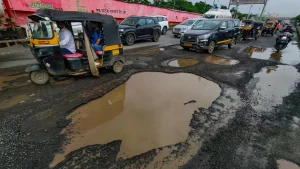The Bombay High Court has delivered a scathing rebuke to Mumbai’s municipal authorities, expressing profound anger over the deteriorating state of city roads plagued by dangerous potholes. The judicial intervention comes as the Mumbai pothole crisis continues to claim lives and cause extensive property damage across the metropolitan area.
A bench of Justices Revati Mohite-Dere and Sandesh Patil expressed severe displeasure over the passing of the buck by various agencies and authorities, highlighting the systematic failure in addressing this persistent urban menace. The court’s intervention marks a watershed moment in holding civic bodies accountable for their negligence in maintaining essential infrastructure.
 Also Read: Mumbai pothole crisis: pothole fix it app and what does it do?
Also Read: Mumbai pothole crisis: pothole fix it app and what does it do?
Other: Noida Airport Jewar
The Mumbai pothole crisis has reached alarming proportions, with recent data revealing the staggering scale of the problem. According to real-time data on the BMC’s official website, 14,386 potholes were reported in Mumbai between June 4 and September 13, demonstrating the unprecedented challenge facing the city’s road maintenance system.
Eight-Day Ultimatum for Immediate Action
The court has issued an uncompromising 8-day deadline for municipal authorities and contractors to address the Mumbai population comprehensively. This directive represents one of the strictest timelines ever imposed by the judiciary on civic infrastructure issues, reflecting the urgency of the situation.
The judicial order encompasses multiple stakeholders, including the Brihanmumbai Municipal Corporation (BMC), road construction contractors, and various government agencies responsible for road maintenance. The court emphasised that this deadline is non-negotiable and failure to comply would result in serious consequences for all parties involved.
Municipal authorities have been struggling with repair timelines throughout 2025. The 72-hour repair deadline set by Minister Ashish Shelar expired Monday, with 1,015 potholes still pending, demonstrating the chronic inability of civic bodies to meet even basic repair commitments during critical periods.
Compensation Framework for Victims and Families
The Bombay High Court’s order includes a groundbreaking provision for compensation to families of individuals who have lost their lives due to pothole-related accidents. This compensation directive establishes a precedent for holding civic authorities financially accountable for infrastructure-related fatalities.
After the Bombay High Court observed that municipal corporations should be held liable for pothole-related losses, social activists and citizen groups argued that the officials responsible for road maintenance must be held personally accountable. This development signals a shift toward individual accountability within the bureaucratic system.
The Mumbai pothole crisis has been characterised by the court as involving “man-made disasters,” emphasising the preventable nature of these incidents. The Bombay High Court on Friday was livid at the Maharashtra Government for failing to comply with its directions and called deaths owing to poorly maintained roads “man-made disasters”.
 Financial Burden and Resource Allocation Challenges
Financial Burden and Resource Allocation Challenges
The economic implications of the Mumbai pothole crisis extend far beyond immediate repair costs. The BMC has allocated Rs 154 crore for repair work this year — a reduction from Rs 205 crore in 2024, indicating decreased investment despite the escalating problem.
Municipal corporations are grappling with the dual challenge of addressing existing potholes while implementing long-term solutions. Of Mumbai’s 2,050 km road network, 1,333 km have already been concretised, showing progress in permanent road improvement initiatives, though significant work remains.
The seasonal nature of the problem compounds the financial burden. The recent spell of heavy rain has worsened the pothole crisis across Mumbai and its suburbs, with over 4,000 potholes reported between August 1 and 22, demonstrating how monsoon conditions exponentially increase infrastructure damage.
Systematic Failures and Accountability Issues
The Mumbai pothole crisis reflects deeper systemic issues within municipal governance structures. Official claims about repairing potholes after complaints were ‘mere eyewash’, pointing out that the Brihanmumbai Municipal Corporation had missed its 30 April 2025 deadline to concretise all city roads.
The court has emphasised that contractors and civic officers must be held directly accountable for failures. This includes recovering penalties from the salaries of concerned officials and implementing stricter oversight mechanisms for road maintenance contracts.
Municipal authorities have implemented technological solutions to address the crisis more efficiently. Mumbai swiftly repairs over 3,200 potholes within 48 hours using the QuickFix app, demonstrating the potential for digital platforms to streamline complaint registration and resolution processes.
 Public Safety Implications and Legal Precedent
Public Safety Implications and Legal Precedent
The Mumbai pothole crisis has created unprecedented public safety hazards, prompting judicial intervention to protect citizens’ fundamental rights. The court has emphasised that maintaining safe roads is a constitutional obligation under Article 21, which guarantees the right to life and personal liberty.
The timing of court interventions often coincides with major public events, highlighting the intersection between infrastructure failures and public safety. Festival seasons particularly expose the inadequacy of road conditions, as seen during recent Ganeshotsav celebrations, when pothole repairs became critical for safe processions.
Future Implications and Reform Measures
The Bombay High Court’s decisive action on the Mumbai potholes crisis sets important legal precedents for urban infrastructure accountability across India. The combination of strict deadlines, compensation requirements, and personal accountability measures creates a comprehensive framework for addressing civic negligence.
The Mumbaipotholes crisis continues to evolve as a test case for judicial intervention in municipal governance failures. The court’s approach demonstrates how legal mechanisms can be effectively employed to ensure civic accountability and protect public safety in urban environments.
This landmark judgment represents a turning point in how Indian courts address infrastructure-related public safety issues, potentially influencing similar cases across the country. The emphasis on compensation and personal accountability may fundamentally change how municipal authorities approach road maintenance and public safety obligations

